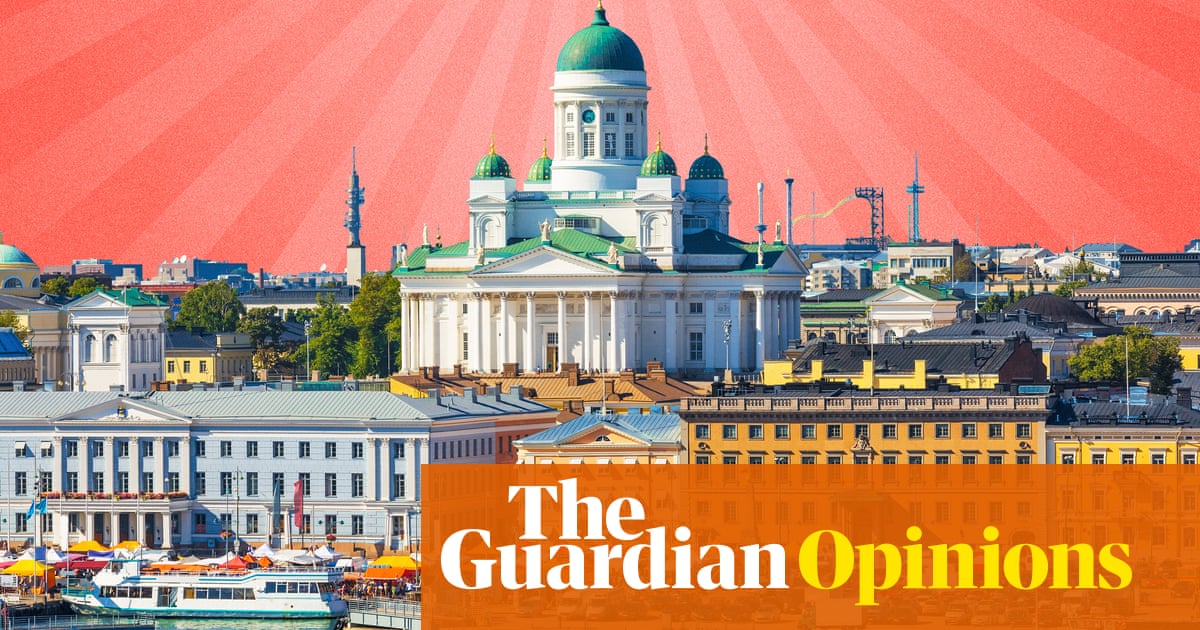The Finns say “spring comes in swinging” – when winter gives way to spring, and green shoots meet the final flurries of snow, often well into April. In Finnish politics, too, some hope is beginning to emerge after a long, dark winter.
In municipal, regional and mayoral elections held across the country last week, rightwing populist parties were roundly defeated, while parties on the left gained ground. In particular, the far-right Finns party saw its vote share collapse, from20% in the general electionof 2023to as low as 7.6%now. This leaves the coalition government of which it forms a part severely weakened and the centre-left Social Democratic party (SDP) with the biggest vote share nationwide (23%). When the Finns party leader, Riikka Purra, admitted defeat on results night, she complained that apunainen aalto, a “red wave”, had swept the country.
The difference between now and the end of last year is like day and night. Back then, I was beginning to wonderwhy I had moved to Finland. It was dark and cold, and “the most rightwing government” the country has ever seen was working hard to slash public spending and immigration. It felt as though the reality of my adopted home couldn’t be further from the rose-tinted accounts I often read in the media, which spoke of “the happiest nation on Earth”, a welfare paradise that is the envy of progressives across the west.
You might ask what has changed since winter. In short, Antti Lindtman’s SDP, along with Minja Koskela’s the Left Alliance and Maria Ohisalo’s the Green League, campaigned as if these elections were a referendum on the governing coalition’s austerity measures. “The number one issue is health and social care,” Koskela told me during her campaign. “People are worried about services moving further away from them, about the accessibility and quality of these services.” Already, qualified workers werethreatening to leavethe country in the face of the government’s cruel tightening of visa rules. With welfare cut and thecost of living soaring, perhaps it is no wonder there has been a backlash from voters.
A direct, open account of the effects of poverty has characterised this election and the approach of some left candidates.Take Alma Tuuva, who won a council seat after pledging to deliver free transport, promotion of the arts and healthcare for transgender people in Helsinki. She is better known to many voters as “pikakahvimemegirl”, an Instagram account with 40,000 followers that posts memes riffing drily about poverty, women’s rights and public spending. In an interview with the Helsinki newspaperKansan Uutiset, Tuuva said: “We, the poor, need support and an easier everyday life so that we can improve our own situation. This reduces exclusion and prevents the escalation of problems.”
Of course, it’s still early days: a few local election wins do not make for a progressive future and the next general election could be as late as 2027. It seems the brunt of dissatisfaction at the coalition government was borne by its junior partner, the Finns party; the leading party, Petteri Orpo’s National Coalition party, actually gained 0.5% overall. Perhaps the culture wars-style rhetoric of the Finns party is on its way out, but the party itself will regroup, and its voters tend to turn out in bigger numbers for general elections. What kind of country might Finland therefore become? It’s hard to say, given that Lindtmanhas signalled his opennessto forming coalitions with the centre right. Perhaps we await something more akin to Starmerism than a full leftist tilt.
One place I find reassurance is in the stoicism I see in the Finns. TheEU’s recent issuingof emergency guidance for its citizens in the event of war reportedly caused panic. Yet as I recall, whensimilar advicewas published here last autumn, the Finns didn’t bat an eyelid. I think it comes from their decades of preparedness for conflict with the Russians. I’ve noticed that most Finnish towns tend to have oversized underground car parks that are clearly designed todouble as bomb shelters.
However, shortly after moving toFinlandin 2018, I noticed that late at night, after several drinks, Finns would often lower their voices to a hush and speak of “the threat from Putin”. I first believed this to be the product of generational trauma, given Finland’s history of invasion by Russia. It did not occur to me then that the Finnish assessment of the threat was accurate and that Europe (certainly Ukraine) was indeed at risk from its neighbour.
Unlike certain other leaders across Europe, who have expressed support oreven admirationfor Vladimir Putin, even Finland’s far-right parties haverushed to distance themselvesfrom Russia since its invasion of Ukraine. This is, after all, a country that recognises the dangers posed by autocratic leaders. Perhaps, then, Finland has this to teach the rest of the world: that cuts to welfare and public spending are popular until they hit voters in their pockets; that genuinely progressive policies appeal to voters tired of austerity; and that there is value in standing up to tyrants.
Perhaps if social democrats build upon these lessons, we would finally see spring begin to break out acrossEurope. But for now, I dare to believe that I see the first shoots of recovery in this country I have grown to respect.
Mike Watson is a media and art theorist and educator born in the UK and based in Finland. His latest book is Hungry Ghosts in the Machine: Digital Capitalism and the Search for Self
